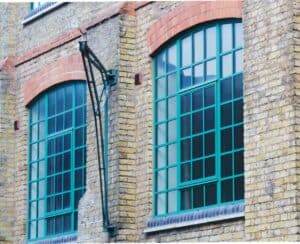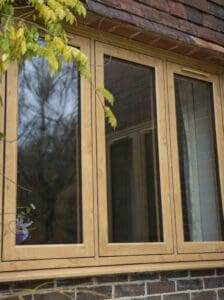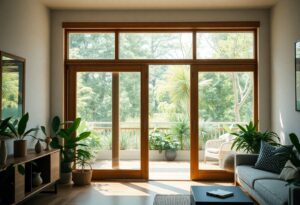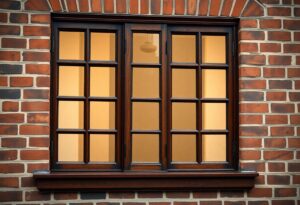You may find yourself struggling with excessive noise from outside, whether it be from traffic, construction, or bustling neighbourhoods. Acoustic windows offer a highly effective solution to alleviate these disturbances, creating a more tranquil living or working environment. These specially designed windows minimise sound transmission, helping you enjoy your space without the unwanted interruptions of external noise. By investing in acoustic windows, you can significantly improve your quality of life and productivity, providing you with the peaceful haven you deserve.

Understanding Acoustic Windows
For those seeking peace amidst the clatter of urban life, acoustic windows offer an ideal solution. These specially designed windows significantly reduce environmental noise, making them necessary for residential and commercial spaces adjacent to busy roads or loud neighbourhoods. By employing advanced constructions and materials, such as laminated glass and high-performance seals, they outperform standard windows in sound attenuation. This results in a tranquil atmosphere, allowing you to enjoy your living or working environment.
Definition and Functionality
Around the topic of soundproofing, acoustic windows are engineered to minimise noise pollution effectively. Unlike standard windows, they utilise specialised construction materials, including laminated glass, multi-chambered frames, and enhanced seals, which collectively contribute to superior sound attenuation properties. These features allow acoustic windows to block a broader range of sound frequencies than conventional options. Technologies such as double-glazing and triple-glazing are often employed, incorporating air or inert gas-filled spaces to provide further insulation against sound.
Types of Acoustic Windows
Along with traditional window options, various types of acoustic windows exist to suit different needs. The most common include double-glazed windows, which offer a good balance of sound reduction and cost; triple-glazed options that provide enhanced noise reduction and thermal insulation; and specialised laminated windows designed for extremely noisy environments. Here are the pros and cons of each type:
| Type | Pros |
| Double-Glazed | Moderate sound reduction & affordable |
| Triple-Glazed | Superior sound isolation & energy efficiency |
| Laminated | Optimal for high-noise areas & added security |
| Standard | Poor sound reduction, low cost |
- Double-glazed: Cost-effective with decent sound isolation.
- Triple-glazed: Offers the best noise reduction.
- Laminated: Designed for maximum attenuation.
- Standard: Most affordable but least effective.
- Specialised: Tailored solutions for extreme conditions.
After evaluating these options, you can choose the perfect acoustic window that meets your soundproofing requirements.
A comprehensive understanding of the types of acoustic windows will aid in making informed decisions that suit your needs and budget. The benefits of each type can greatly influence your comfort and peace at home or in your workspace, so weighing their pros and cons is paramount. Here’s a summary table for quick reference:
| Window Type | Key Feature |
| Double-Glazed | Cost-effective, moderate sound isolation |
| Triple-Glazed | Best for maximum sound and thermal insulation |
| Laminated | Highly effective in loud environments |
| Standard | Least effective, budget-friendly option |
| Specialised | Custom solutions for specific noise challenges |
- Double-glazed: Economical choice for general use.
- Triple-glazed: Ideal if budget allows for superior isolation.
- Laminated: Excellent for homes near airports or railways.
- Standard: Least protective against noise.
- Specialised: Custom solutions targeting specific needs.
After reviewing these types, you are better equipped to choose the right acoustic window for your environment.
Benefits of Acoustic Windows
One of the prominent benefits of acoustic windows is their ability to significantly reduce external noise, creating a more tranquil indoor environment. They are particularly effective in urban areas or near busy roads and facilities, where studies have shown they can reduce noise by up to 90%. This means you can enjoy a quieter home or office space, improving your overall quality of life and productivity. (Investing in acoustic windows is a wise choice for noise-sensitive individuals.)
Noise Reduction Effectiveness
Effectiveness in reducing noise pollution is one of the primary reasons to consider acoustic windows. Extensive research reveals that these windows can deliver a reduction in sound transmission of between 20-30 decibels, making them particularly beneficial in regions plagued by high noise levels. For instance, residents living near airports or busy intersections have reported noticeable improvements in their living conditions when acoustic windows were installed. The substantial reduction in noise not only enhances comfort but also contributes to better sleep and concentration.
Additional Advantages
For homeowners and business owners, acoustic windows also bring a range of additional advantages. Alongside their primary function of noise reduction, they enhance energy efficiency by keeping your space warmer in winter and cooler in summer. They also provide UV protection, safeguarding your interiors from harmful rays that cause fading. Furthermore, their robust design adds an extra layer of security against break-ins, making them an all-round superior choice for both residential and commercial properties.
Benefits of investing in acoustic windows extend beyond mere noise reduction. You’ll find that these windows significantly improve your home’s energy efficiency, leading to potential savings on heating and cooling costs due to better insulation. Additionally, the UV protection offered helps preserve the quality of your furnishings, while the enhanced security features deter intruders, giving you peace of mind. Overall, choosing acoustic windows is a worthwhile investment that can greatly enhance your living or working environment.
Choosing the Right Acoustic Windows
The right acoustic windows can significantly enhance your comfort in noisy environments. When choosing windows, evaluate various options and don’t hesitate to share your experiences on what DIY improvements have you made that “soundproof” your space by visiting this forum. Understanding the specifications is key to ensuring optimal noise reduction and overall effectiveness in your home.
Factors to Consider
Windows play a vital role in the overall soundproofing of your home. Here are some key considerations when selecting acoustic windows:
- Noise Reduction Rating (NRR)
- Window Materials
- Frame Construction
- Installation Requirements
Thou must evaluate these factors to ensure you achieve the desired soundproofing outcome.
Professional Installation vs. DIY
Beside the option of DIY, hiring professionals for acoustic window installation offers distinct advantages. While it may involve a higher cost, their expertise ensures optimal window placement and performance outcomes, which can result in better noise reduction. You’ll also eliminate risks associated with improper installation, which can diminish the effectiveness of your acoustic windows.
Understanding the implications of DIY versus professional installation is important. You may feel tempted to save costs by undertaking the project yourself; however, the potential for mistakes can lead to compromised performance outcomes. Moreover, skilled installers possess expertise that contributes to the longevity and efficiency of the windows. Weighing these factors carefully is key to ensuring that your investment delivers the best results in noise reduction.
Case Studies
Many property owners have discovered the benefits of acoustic windows through various case studies. Here are notable examples:
- Residential building in London: Noise reduction of 30 decibels.
- Urban apartment complex in Manchester: 50% decrease in street noise.
- Office premises in Birmingham: Enhanced sound insulation leading to a 40% drop in external noise.
- Hotel in Edinburgh: Guest satisfaction improved by 80% post-installation.
Residential Applications
Any homeowner considering acoustic windows should look into specific properties that have integrated them effectively. For instance, a Victorian home in Leeds saw a significant noise reduction from outside traffic, improving from disruptive levels to a peaceful living environment. This transformation ensured a more serene ambiance, fostering a comfortable space (considering your family’s well-being can sway your choice here).
Commercial Applications
Among commercial spaces, various buildings have thrived thanks to acoustic windows. Offices in Liverpool reported a remarkable improvement in employee focus and productivity, with tenants appreciating the stark decrease in distracting sounds. Enhanced noise control led to increased tenant retention. (This factor can greatly influence your investment decisions regarding property management).
Hence, as businesses look to enhance workplace environments, the installation of acoustic windows stands out as a sound investment. Numerous commercial properties have noted reduced distractions, fostering better communication and overall job satisfaction, which is vital for long-term success and employee retention (making this upgrade a pivotal step for future-proofing your workspace).
Maintenance and Care
All acoustic windows require regular maintenance and care to ensure they function properly over time. This includes inspecting the seals and frames for any signs of wear, as well as keeping the glass surfaces free from dirt and debris. It’s advisable to use a soft cloth with mild soapy water for cleaning, avoiding abrasive materials that could scratch the surface. (Investing in high-quality cleaning supplies can make a significant difference to the longevity of your windows.)
Cleaning and Upkeep
Above all, regular cleaning is crucial for preserving the clarity and functionality of your acoustic windows. Use a gentle, non-abrasive cleaner and a soft cloth to wipe down the surfaces, ensuring no residues remain that could impair performance. For frames, a damp cloth is typically sufficient; avoid any harsh chemicals. Additionally, check for any accumulated debris in tracks or frames, as this can impact their effectiveness, so clear these areas promptly. Taking these measures will enhance your windows’ life and sound-dampening abilities.
Signs of Damage and Repair
Any signs of damage to your acoustic windows should be addressed promptly to maintain their effectiveness. Common issues to look for include condensation between the glass panes, which indicates a seal failure, or chips and cracks in the glass, which can compromise sound insulation. If you notice any of these signs, consider contacting a professional for assessment and repair. Timely intervention could prevent more extensive damage and preserve your investment in soundproofing.
A regular inspection of your acoustic windows will help you identify early signs of damage, such as drafts or reduced sound insulation. If you observe condensation or discolouration, it’s a prompt to seek professional evaluation. Addressing any visible cracks or issues swiftly contributes significantly to maintaining the window’s performance. Your proactive approach will ensure you enjoy the benefits of a quieter environment for many years.
Cost Considerations
Not all acoustic windows are created equal when it comes to cost. Various factors influence the price, including the material used, the size of the windows, and the reputation of the manufacturer. On average, you can expect prices to range from £200 to £1,000 per window. (It’s crucial to compare different options to find the best fit for your requirements.)
Pricing Overview
On average, acoustic windows range from £200 to £1,000, depending on factors such as material, size, and the manufacturer. Custom sizes or high-performance materials may push costs higher. (Choosing the right manufacturer can significantly impact both price and performance.)
Long-Term Investment
The installation of acoustic windows is indeed more than a simple expense; it’s a long-term investment that can lead to substantial savings on energy bills while enhancing your property’s value. Over time, the thermal efficiency and soundproofing properties can make a notable difference in your overall living experience. (Evaluating potential savings could justify the initial outlay.)
The benefits of installing acoustic windows extend beyond immediate comfort. By improving your property’s energy efficiency and noise reduction, you not only enjoy a more peaceful environment but also add value should you decide to sell. Additionally, the reduced wear and tear on heating or cooling systems can lead to significant savings over the years. (Prioritising durable options can enhance your investment’s longevity.)
Overview, investing in acoustic windows presents various advantages. Although the initial cost may be higher compared to standard windows, the substantial savings on energy expenses and the positive impact on property value make it a wise choice. Furthermore, the comfort and tranquility provided by superior soundproofing features contribute to an enhanced living experience. (Considering both short-term costs and long-term benefits will aid in making an informed decision.)
Conclusion
Considering all points, acoustic windows present an effective solution for you to tackle noise disturbances in your environment. By investing in these specially designed windows, you can significantly reduce outside noise, enhancing your comfort and overall living experience. For further tips on minimising noise in rented spaces, you might find it beneficial to explore what are some ways I can soundproof my window in a …. Protecting your peace of mind is well within your reach.
FAQ
Q: What are acoustic windows?
A: Acoustic windows are specially designed windows that reduce the amount of sound coming from outside, making them ideal for use in noisy environments. They typically feature multiple layers of glass and specialised seals that help block out unwanted noise from traffic, construction, and other disturbances.
Q: How do acoustic windows work?
A: Acoustic windows work by using thicker glass and seals that are engineered to absorb and deflect sound waves. The combination of different materials and thicknesses creates an effective barrier against sound transmission, significantly reducing noise levels in the interior space.
Q: What types of noise can acoustic windows reduce?
A: Acoustic windows are effective at reducing various types of noise, including traffic noise, aircraft noise, construction sounds, and other urban disturbances. They are particularly beneficial in areas with high volumes of noise pollution, such as city centres and near busy roads.
Q: Are there specific installations for acoustic windows?
A: Yes, proper installation is vital for the performance of acoustic windows. They should be fitted by professionals to ensure that all seals are tight and that the windows are correctly aligned. This helps to maximise their soundproofing capabilities, ensuring that noise reduction is as effective as possible.
Q: Can acoustic windows help improve energy efficiency?
A: Yes, acoustic windows can also enhance energy efficiency. The multi-layered design not only blocks sound but also provides better insulation against heat loss. This can lead to reduced energy bills as homes maintain comfortable temperatures more effectively.
Q: Are acoustic windows suitable for all types of buildings?
A: Acoustic windows can be installed in various types of buildings, including residential homes, commercial buildings, and even schools. They are particularly useful in environments where noise levels can impact comfort and productivity, making them a versatile solution for many settings.
Q: What are the maintenance requirements for acoustic windows?
A: Maintenance for acoustic windows is relatively straightforward. Regular cleaning of the glass is recommended, along with periodic checks on seals and frames to ensure they remain intact. If any issues arise, it is advisable to consult a professional to assess the windows and ensure their continued effectiveness in noise reduction.













